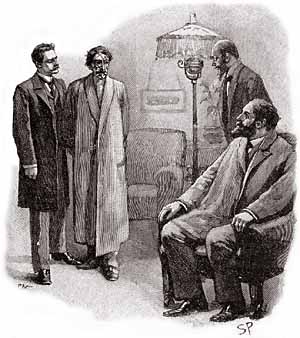“There was a coloured gas-lamp inside which was turned so low that I could see little save that the hall was of some size and hung with pictures. In the dim light I could make out that the person who had opened the door was a small, mean-looking, middle-aged man with rounded shoulders. As he turned towards us the glint of the light showed me that he was wearing glasses. | 「内側には着色ガラスのガス灯があり / それが非常に暗く灯されていたので / 私はほとんど何も見えませんでした / ホールが相当広く絵画が掛けられていたこと以外◆ぼんやりした光の中で / 私は見分ける事ができました / 扉を開けた人物は / 背中の曲がった背の低い、みすぼらしい外見の、中年の男だと◆彼がこちらを向いた時 / 光の輝きで彼が眼鏡を掛けていたことが分かりました」 |
“ ‘Is this Mr. Melas, Harold?’ said he. | 「『ハロルド、こちらがメラスさんか?』 / 彼は言った」 |
“ ‘Yes.’ | 「『そうです』」 |
“ ‘Well done, well done! No ill-will, Mr. Melas, I hope, but we could not get on without you. If you deal fair with us you’ll not regret it, but if you try any tricks, God help you!’ He spoke in a nervous, jerky fashion, and with little giggling laughs in between, but somehow he impressed me with fear more than the other. | 「『よくやった、よくやった! / 悪く思わないで下さい / メラスさん / そう願います / しかしあなたがいないとやっていけないもので◆私達の言うとおりにすれば後悔はしないでしょう / しかし何か企めば / 大変なことになりますよ』 / 彼は神経質で断続的な話し方をしました / 間に忍び笑いを入れながら / しかしどういうわけか彼の方がもう一人よりより恐ろしい印象を与えました」 |
“ ‘What do you want with me?’ I asked. | 「『私にどうして欲しいのですか?』 / 私は尋ねました」 |
“ ‘Only to ask a few questions of a Greek gentleman who is visiting us, and to let us have the answers. But say no more than you are told to say, or–’ here came the nervous giggle again– ‘you had better never have been born.’ | 「『ただギリシャ人の男にいくつか質問していただくだけです / ここに滞在している / そして返答を我々に通訳してもらうということです◆しかしあなたが言えと言われた以上の事を話せば』 / ここで神経質な忍び笑いをし / 『あなたは生まれて来ないほうがよかったと思うでしょうな』 |
“As he spoke he opened a door and showed the way into a room which appeared to be very richly furnished, but again the only light was afforded by a single lamp half-turned down. The chamber was certainly large, and the way in which my feet sank into the carpet as I stepped across it told me of its richness. I caught glimpses of velvet chairs, a high white marble mantelpiece, and what seemed to be a suit of Japanese armour at one side of it. There was a chair just under the lamp, and the elderly man motioned that I should sit in it. The younger had left us, but he suddenly returned through another door, leading with him a gentleman clad in some sort of loose dressing-gown who moved slowly towards us. As he came into the circle of dim light which enabled me to see him more clearly I was thrilled with horror at his appearance. He was deadly pale and terribly emaciated, with the protruding, brilliant eyes of a man whose spirit was greater than his strength. But what shocked me more than any signs of physical weakness was that his face was grotesquely criss-crossed with sticking-plaster, and that one large pad of it was fastened over his mouth. | 「彼は話しながら / 扉を開け部屋に招き入れました / 非常に豪華な内装のように思えました / しかしここも半分閉じられた一つのランプの光しかありませんでした◆部屋はとても広く / 私が歩く時にカーペットの中に沈み込んでいく感覚で / 上等なものだと分かりました◆私は見ることができました / ベルベットの椅子 / 高い白大理石のマントルピース / 片側には日本の鎧一式らしきものが◆ランプのすぐ下に椅子がありました / そして高齢の男がそこに座れという身振りをしました◆若い方の男は出て行きました / しかし彼は突然もう一つの扉から戻ってきました / 彼に連れられて / だぶだぶのガウンのようなものを引っ掛けた男が / ゆっくりとこちらにやってきました◆彼が鈍い光の輪の中に入ってきた時 / それで私は彼をもっとはっきり見ることが出来ましたが / 私は彼の外見に恐怖でぞくっとしました◆彼は死人のように青ざめ恐ろしくやせ衰えていました / 飛び出てギラギラした目は / 精神力で体力を補っている男のものでした◆しかし、どんな体力的な衰えの兆候よりも衝撃的だったのは / 彼の顔に異様な十文字の絆創膏が貼ってあったことです / そして一つの大きな絆創膏は彼の口を塞いでいました」 |
 | |
“ ‘Have you the slate, Harold?’ cried the older man, as this strange being fell rather than sat down into a chair. ‘Are his hands loose? Now, then, give him the pencil. You are to ask the questions, Mr. Melas, and he will write the answers. Ask him first of all whether he is prepared to sign the papers?” | 「『石版はあるか、ハロルド?』 / 年上の男が叫びました / この異様な人物が座るというより椅子に倒れこむと◆『彼の手は自由になっているか? / よし、それじゃ / 鉛筆を渡してやれ◆あなたは質問をする役だ / メラスさん / そして彼は答えを書く◆真っ先に彼に聞いてくれ / 書類にサインする気になったかどうか』」 |
“The man’s eyes flashed fire. | 「男の目はギラリと光った」 |
“ ‘Never!’ he wrote in Greek upon the slate. | 「『絶対に書かん!』 / 彼はギリシャ語で石版に書いた」 |
“ ‘On no conditions?’ I asked at the bidding of our tyrant. | 「『何があってもか?』 / 私は暴君の指示どおりに尋ねた」 |
“ ‘Only if I see her married in my presence by a Greek priest whom I know.’ | 「『彼女が私の目の前で結婚するところを見た時だけだ / 私が知っているギリシャ人の司祭によって』」 |
“The man giggled in his venomous way. | 男は悪意に満ちた笑い方をしました |
“ ‘You know what awaits you, then?’ | 「『では、どうなるか分かっているな?』」 |
“ ‘I care nothing for myself.’ | 「『自分のことはどうなっても構わん』」 |
“These are samples of the questions and answers which made up our strange half-spoken, half-written conversation. Again and again I had to ask him whether he would give in and sign the documents. Again and again I had the same indignant reply. But soon a happy thought came to me. I took to adding on little sentences of my own to each question, innocent ones at first, to test whether either of our companions knew anything of the matter, and then, as I found that they showed no sign I played a more dangerous game. Our conversation ran something like this: | 「これらが質問と答えの例です / 奇妙な、半分は話し、半分は書くという会話の◆何度も / 私は彼に尋ねなければなりませんでした / 彼が音を上げて文書にサインするかどうか◆その度に同じ怒りの返答がありました◆しかしすぐに私はある上手い方法を思いつきました◆私はちょっとした自分の文章を付け加える事にしました / 全ての質問に / 最初は問題のない文で / どちらかの男がこの事に気付くかどうかをテストするため / その後 / 彼らが気付かない様子なのを見て / 私はもっと危険な賭けにでました◆我々の会話はこのように続きました」 |